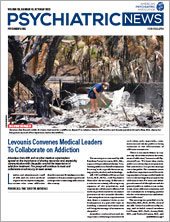A psychiatrist in solo private practice was facing a dilemma. His amiable and easygoing patient of 10 years who had been stable for the past nine years was suddenly having problems at work characterized by agitation, uncharacteristic conflict with peers, and panic attacks. After her second panic attack at work, her boss asked her to take a couple of weeks off for medical leave, after which she could return but only with a doctor’s note certifying her safety at work. The psychiatrist immediately recognized that his report was a risk assessment that could influence decisions regarding his patient’s employment—his patient’s boss was worried about the potential for violence at work. Suddenly, the psychiatrist was thrust into two potentially conflicting roles, advocating for his patient while responding to the needs of a third party.
Scenarios like this are common in psychiatric practice. The most recognizable involves Social Security Administration (SSA) forms that psychiatrists complete when patients apply for Social Security Disability Insurance benefits. Here, the psychiatrists’ opinion about patients’ social interaction styles and patterns and ability to perform activities of daily living and other tasks related to child care, homemaking, school, and work are used by the SSA to determine eligibility. Many psychiatrists complete these forms without a second thought, but the task is not as straightforward as it may seem. Psychiatrists working in forensic hospitals, corrections, and the military are more familiar with the conundrum they face when their roles conflict. Decisions regarding privileges or movement of patients within or outside a forensic hospital are made by a third party often relying on their psychiatrist’s report. Military psychiatrists face the pressure of abiding by the military’s mission of maintaining a fighting force, providing treatment while conducting evaluations regarding a soldier’s disability and fitness for duty, or recommending separation from service.
In these situations, psychiatrists struggle to manage competing and often conflicting obligations. Known as “dual agency,” “dual roles,” “overlapping roles,” or “double agency” as discussed in Topic 3.1.3 of the “
APA Commentary of Ethics in Practice,” psychiatrists operate as double agents. The primary obligation of psychiatrists in a treatment relationship is to patients, but in dual agency situations, that obligation is not absolute as psychiatrists also owe some obligation to a third party, a forensic role. This divided loyalty can be difficult to navigate. Psychiatrists who take on a forensic role for patients may adversely affect the therapeutic relationship, thus the recommendation is to avoid dual agency situations if possible.
Psychiatrists completing forms for Social Security disability benefits may not realize that they are performing a forensic psychiatry function. Their ethical obligation to advocate for their patients’ interests could come in sharp conflict with honesty in completing the forms. On the one hand, psychiatrists who believe their patients are not disabled enough to qualify for Social Security disability benefits may feel pressured to state otherwise, which is unethical. On the other hand, honest documentation rejecting the claim could rupture the therapeutic alliance irreparably.
The example in the opening paragraph is a tougher challenge. For the psychiatrist to accurately opine on his patient’s safety to return to work, he must do more than accept his patient’s words. A thorough risk assessment includes interviewing collateral sources such as the patient’s family members, close associates, and relevant work colleagues and reviewing relevant collateral documents. Many psychiatrists in private practice do not have time for such comprehensive assessments. Worse still, should the psychiatrist generate a negative report, it could be devastating to the therapeutic alliance cultivated over many years. That said, most patients do not have the resources to engage a forensic psychiatrist for this task, thereby causing treating psychiatrists to manage the situation the best they can.
To be clear, dual agency is not unethical as the shortage of psychiatrists across the country can force psychiatrists to be in dual roles. Additionally, SSA requires treating psychiatrists to complete the forms; therefore, the choice is between completing or not completing them. Given the indigent nature of patients seeking these benefits, treating psychiatrists may rightfully conclude they must complete the forms. Further, completing the forms for deserving patients is a justifiable form of advocacy for patients’ needs. However, Topic 3.1.3 of the “APA Commentary on Ethics in Practice” states that “Psychiatrists should inform patients about the potential for competing obligations within the treatment or other nonclinical evaluation, such as a forensic evaluation,” including how the therapeutic relationship could be impacted by the psychiatrist’s opinion.
Wherever possible, treating psychiatrists should strive to eliminate potentially compromising dual roles by attending to the separation of their work as clinicians from the demands of third parties. When not possible, psychiatrists should be alert to the ramifications of being a double agent and tread carefully. ■

